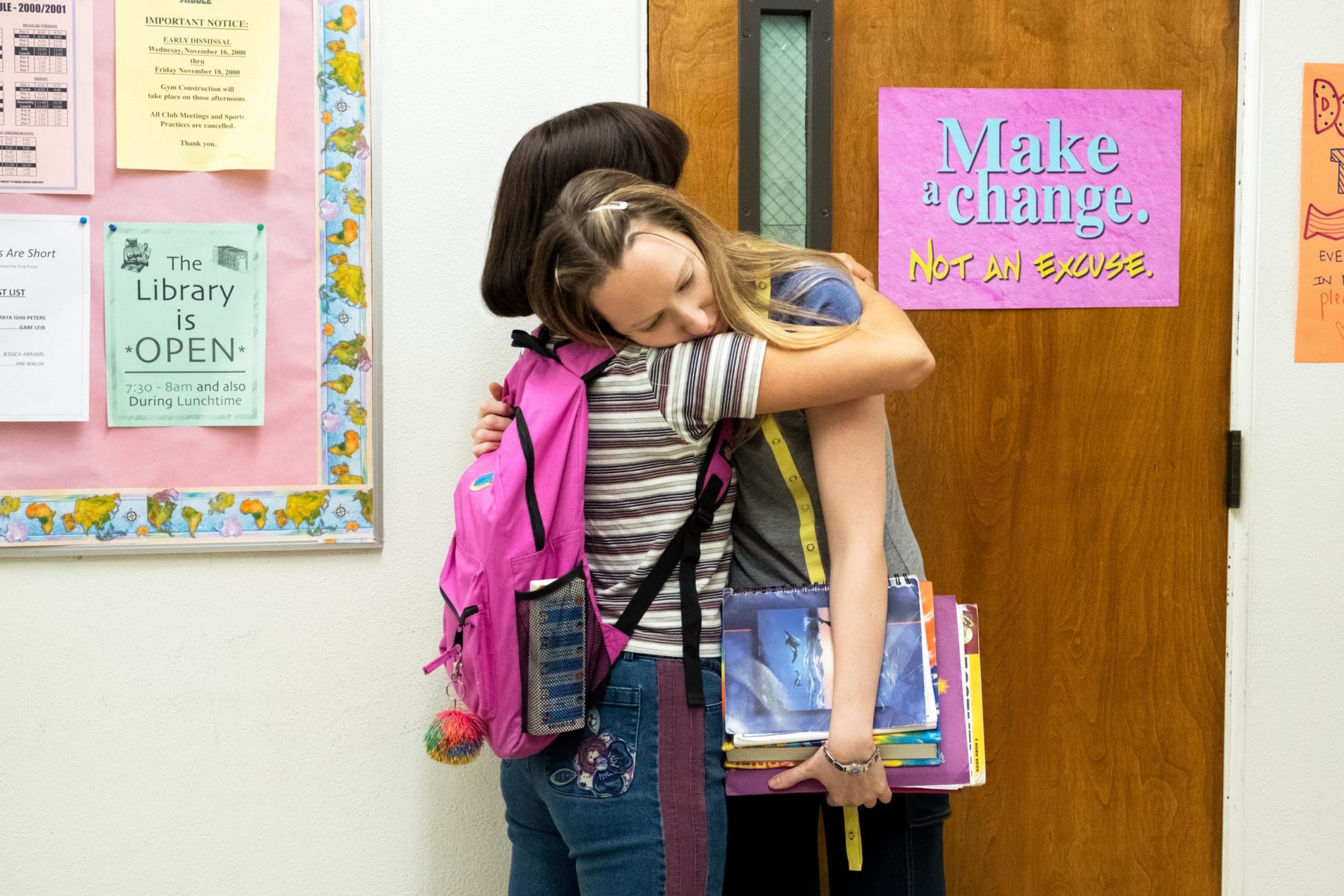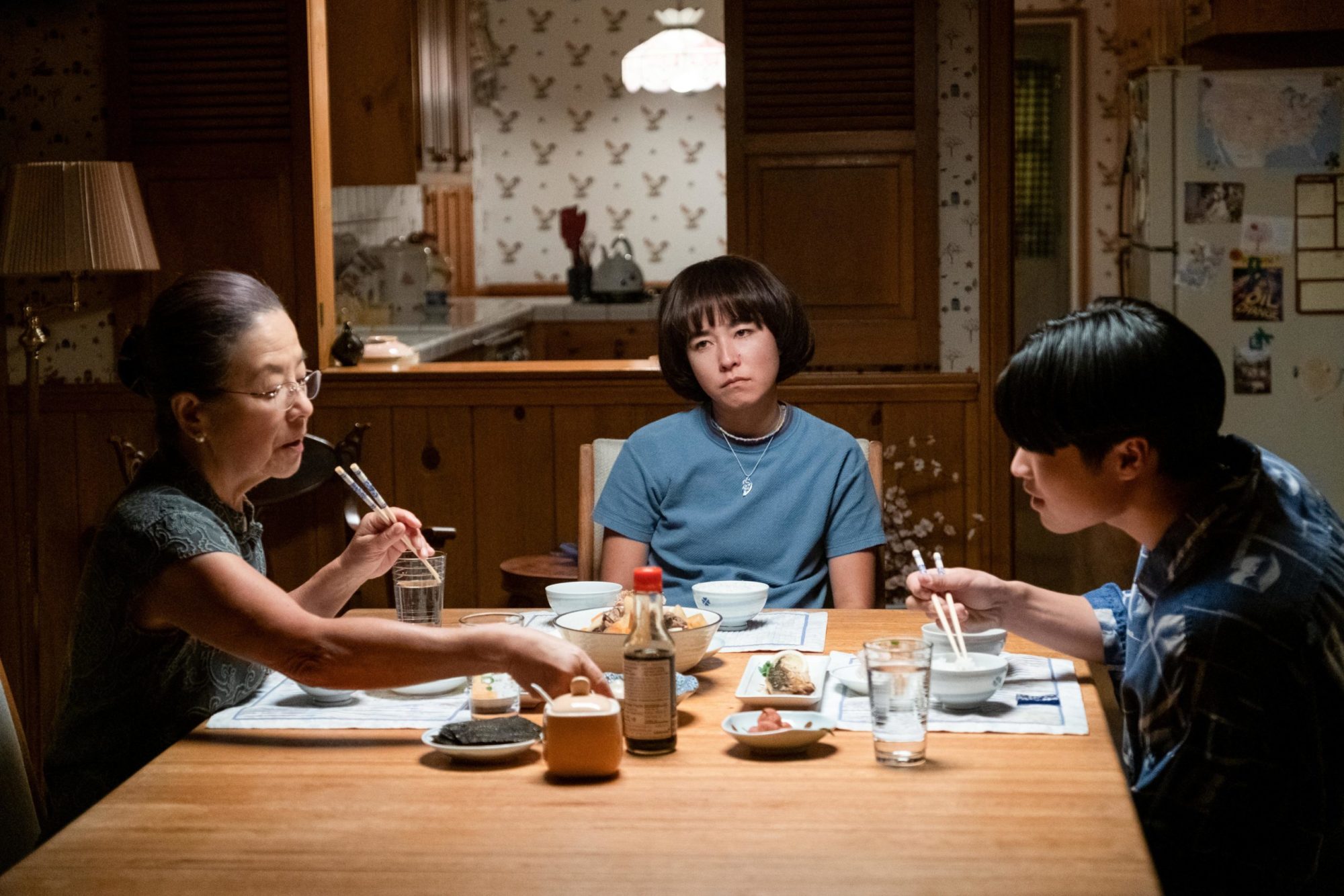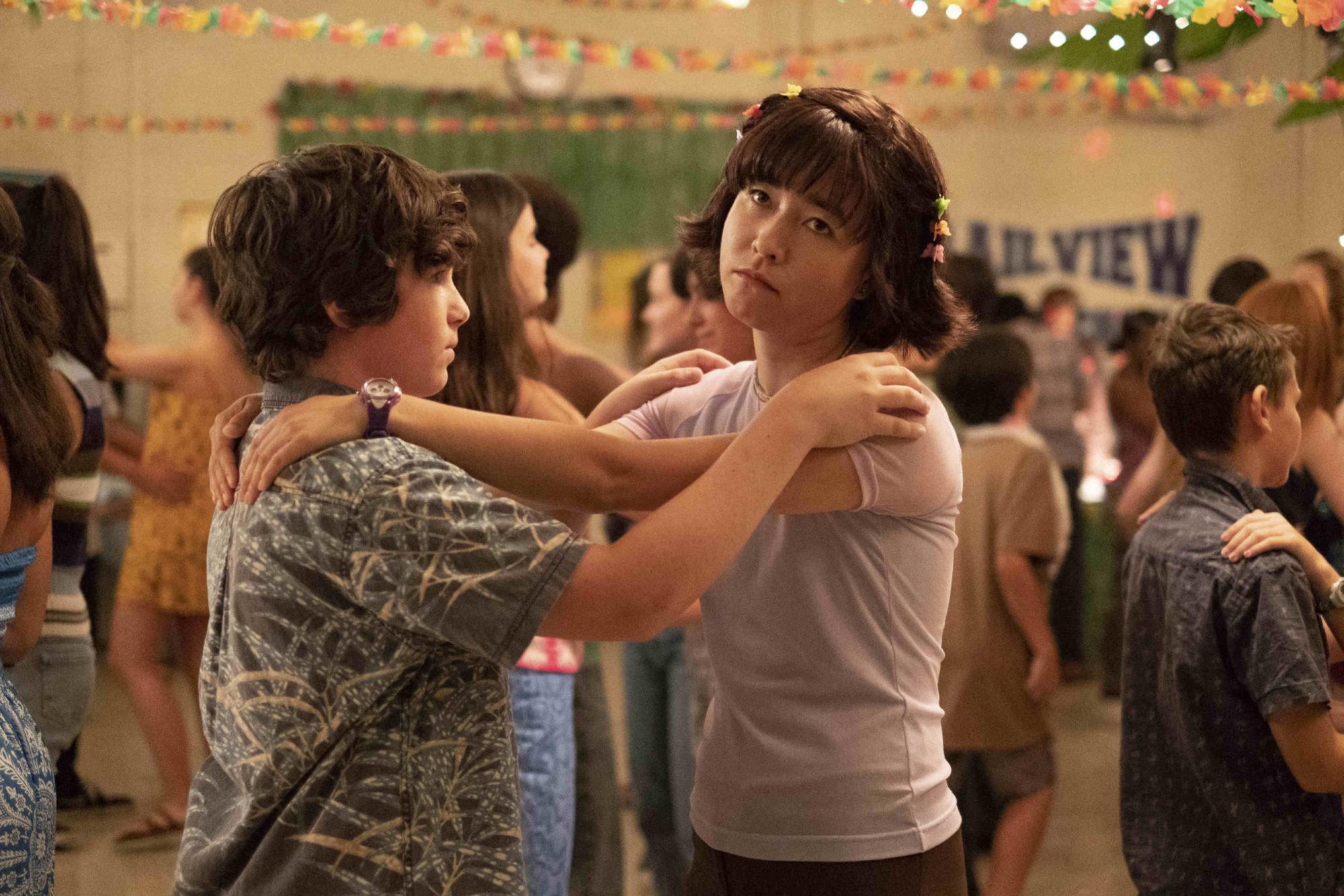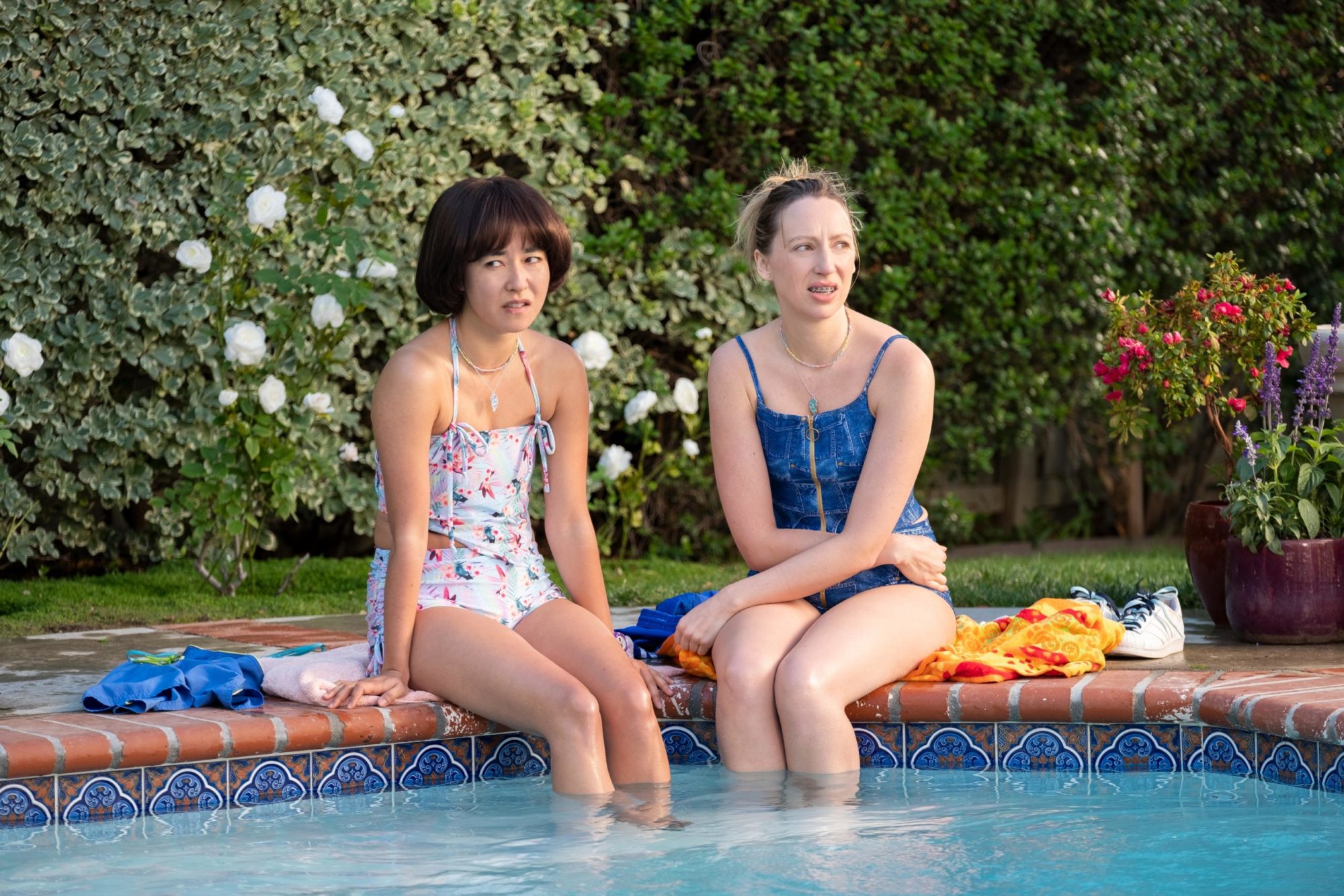PEN15
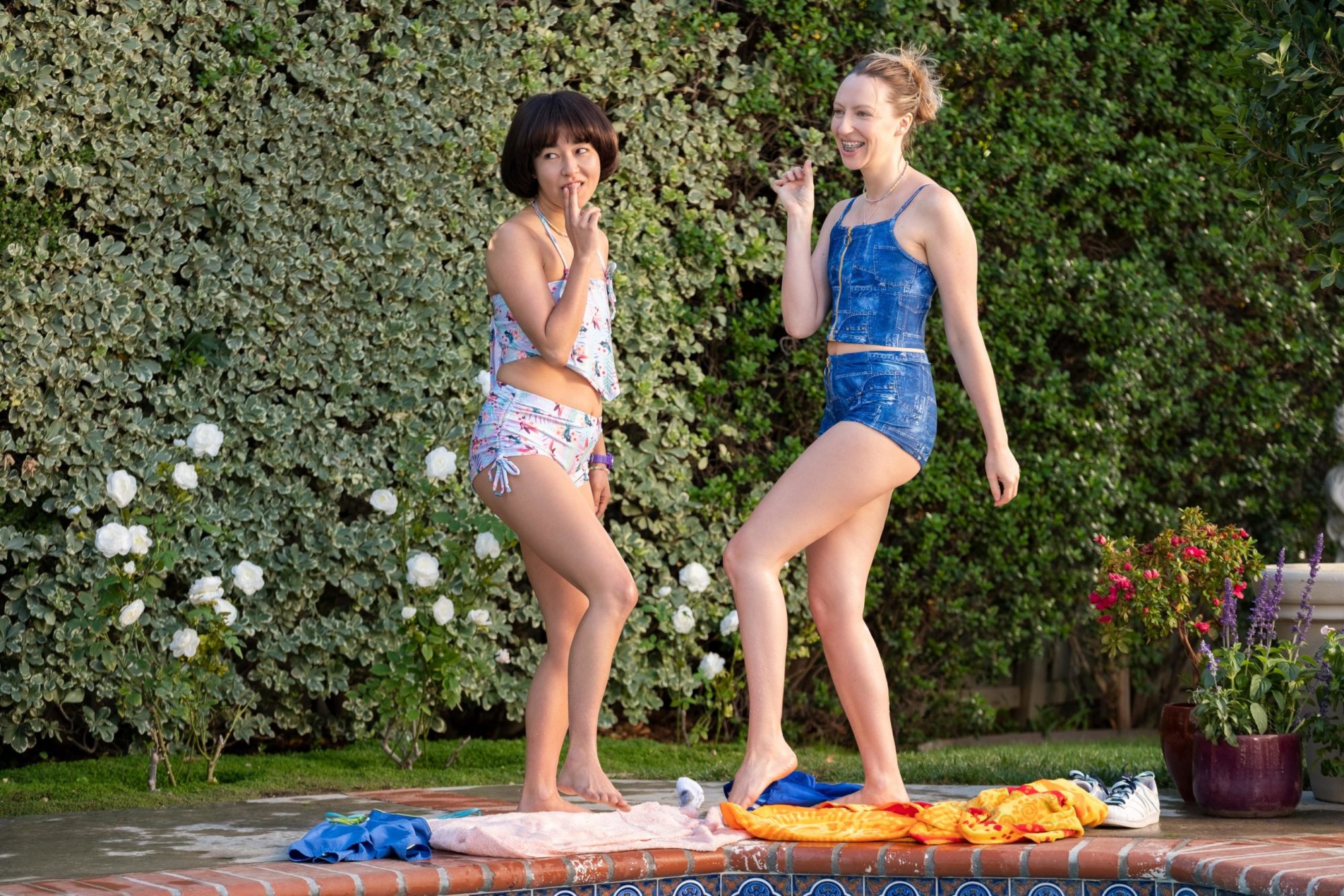
PEN15, 2020 [courtesy of HULU]
Share:
PEN15 shouldn’t work—two 33-year-old women acting like 13-year-olds while surrounded by a cast of actual 13-year-olds—but good God, does it. PEN15 is a strange, funny, and often poignant series in which creators and actors Maya Erskine and Anna Konkle play fictionalized versions of their middle school selves. Although this show often gets the throwaway label of cringe comedy, there’s something deeper at work here: a methodical, thoughtful attempt at reconciling one’s adult self with the fractured, painful (and yes, sometimes funny) memories of early teenagerdom.
Set in 2000, BFFs Maya Ishii-Peters and Anna Kone navigate the tortuous halls of middle school, through encounters with mean girls (and mean boys), masturbation, obsessive crushes, drama at school dances, and disastrous sleepovers. It’s often hilarious—like, laugh-out-loud-alone-in-your-house hilarious. But Erskine and Konkle—along with fellow creator Sam Zvibleman, who does not act on the show but has a kind of avatar in the character Sam, played by the talented Taj Cross—don’t hesitate to lean into the more distressing aspects of this strange time of life. Episodes explore such topics as racism, divorce, loneliness, and bullying with immense care and compassion.
PEN15, 2020 [courtesy of HULU]
Erskine and Konkle, who became friends in college, studied experimental theater, a background that is put to good use in their performances. I was able to suspend my disbelief concerning their real ages with surprising ease, and this suspension is a credit to the actors’ commitment to the show’s unique premise. Both actors wear binders around their chests and ill-fitting jeans purchased from kids’ catalogues. Konkle wears braces to great effect in well-timed reveals of her metallic smile. Erskine sports a retainer and a bowl-cut wig—an unfortunate hairstyle that stems from a disastrous self-imposed haircut the night before the first day of seventh grade. Even more than their styling, however, the characters’ body language and mannerisms carry the illusion. When Maya is uncomfortable or feels awkward (which is often), she keeps her chin down, avoids eye contact, and swings her arms around her body. Anna, taller than most of her peers, slouches with one arm across her stomach—a pose that Konkle recalls making as a young teenager, self-conscious about her body and determined to hide it.
The emotional intensity of Erskine and Konkle’s performances comes from their ability to look inward at their own deeply held insecurities. The content of the show takes inspiration from their experiences growing up, and many of the most visceral scenes of embarrassment are inspired by the actors’ memories. Sometimes this re-enactment takes the forms of set design and costume—Anna’s home in the show is almost identical to Konkle’s home when she was growing up, and the wig Erskine wears recalls actual horrendous haircuts of her past.
PEN15, 2020 [courtesy of HULU]
PEN15, 2020 [courtesy of HULU]
More often the similarities are character driven. Maya fights with her mom (who, in an added layer of blur between autobiography and fiction, is played by Erskine’s actual mom, actor Mutsuko Erskine), and they later reconcile while taking a bath together, a ritual from the real life Erskines. “It’s like a form of therapy and bonding and, you know, making art with your family but reliving certain traumatic experiences,” Maya Erskine said in an interview with NPR. This therapeutic element, and the emotional turmoil it can ignite, is a huge part of their roles as creators and actors. “It can feel sort of masochistic sometimes, [when] you’re reliving painful things that you’ve written for yourself exactly as it happened. And then you’re reliving that, going, why am I doing this?” Konkle said, laughing, in the same NPR interview.
Although the creators are adamantly committed to relaying events as they happened, occasionally the more agonizing memories get rewrites. In “Posh,” a disarmingly intense episode from the first season, Maya and Anna have a racial reckoning after a school project leads to racist behavior toward Maya. “That was something … I don’t think I fully explored till we started writing this show,” Erskine said, in regard to the kind of micro-aggressions and casual racism she experienced growing up. In the pivotal scene, Anna, who senses that something is wrong but doesn’t fully understand what is happening, does not stand up for her friend. Later, Maya, upset, struggles to make sense of the events of the day. What follows is a well-meaning but ultimately misguided attempt by Anna to “report racism” at school, which leads to Maya being even more singled out and hurt. The historical rewrite occurs at the end of the episode, when Anna apologizes, and admits that she can never fully understand what Maya is going through. “I don’t think I ever received that in life,” Erskine said.
Another affecting rewrite happens at the end of season two. The second season, which premiered in September 2020, begins in the summer after seventh grade and is noticeably darker than the first. Things are not going well for our two protagonists. After a PG-rated “threesome” in a supply closet at a school dance, Maya and Anna are labeled “desperate sluts” by the whole school. The two decide they’ve had enough of mean girls, only to be disappointed by even meaner boys. Both girls feel that their lives—their bodies, their social standing in school, their families—are increasingly out of their control. Anna’s parents are divorcing—as Konkle’s real parents did—and it’s messy. Anna angrily takes the side of her dad, in accordance with a major theme of the season—“That pro-dad, anti-mom, anti-yourself … sexism that you’re taught,” says Konkle. In the final episode, Anna has a revelation. Perhaps her dad isn’t the hero she thought, and her mother isn’t the villain. She apologizes to her mom in an emotional scene. Of course, that conversation didn’t happen in real life. Konkle didn’t come to terms with her feelings toward her mother until her 20s. Once again, a kind of mental hijacking—of the past, of memory, of trauma—has occurred.
PEN15, 2020 [courtesy of HULU]
“Cringe comedy” set against a middle-school backdrop is clearly having a moment, as evidenced by the popularity of PEN15, the television series Big Mouth, and Bo Burnham’s Eighth Grade. Why are we suddenly so interested in reliving an awkward, pimply adolescence, a time in our lives that many of us spend decades trying to forget? Why do these shows resonate so deeply with adults?
PEN15’s re-enactments provide a kind of catharsis. Not just for Konkle and Erskine personally, but often for the audience as well. When we cringe with Anna and Maya, there’s a sense of shared (and therefore lessened) shame. There’s a big difference between cringing at someone and cringing with someone. In an extensive video essay on the topic, the YouTuber Contrapoints uses concepts from Melissa Dahl’s book Cringeworthy: A Theory of Awkwardness to differentiate these two emotional responses as “contemptuous cringe” and “compassionate cringe.” Contemptuous cringe involves distancing yourself from the subject. When I think of contemptuous cringe, I think of The Office, a show I find increasingly difficult to rewatch.
Compassionate cringe, by contrast, is a form of empathy, not only for the characters in the show, but for ourselves. Compassionate cringe can elicit a sense of camaraderie, and the comforting refrain that you are not alone. When done well, the effect is profound. PEN15 lets us, through Erskine and Konkle’s methodical acting and re-enacting, look back on those years with the new, adult lens we have and feel something other than self-hatred. And maybe even laugh—collectively, and with kindness.
EC Flamming is a writer in Atlanta. She is currently in between television shows. If you have a show suggestion, please DM @ecflamming.
